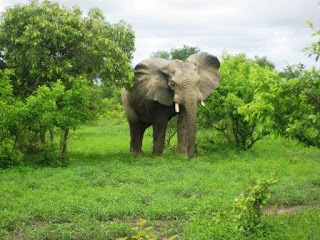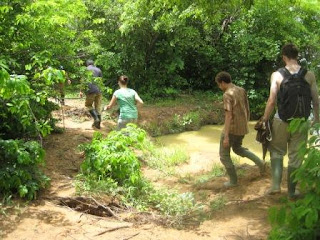Last week, I came up with my strategy for the rest of the summer, and visited with the Zonal Coordinator of REP in Tamale to get her on board and excited about the results of the interviews. This week in Damongo was spent biking around town meeting with business owners. The aim is to learn what kind of support business owners need to be more successful and what the role of the BAC and local experts could/should play. With the information I gather, I will draw out trends and key findings to present to this BAC so they can better understand the views of the people they are aiming to help, and more importantly to the Zonal Office in Tamale, because they are the decision makers who can affect not only this district, but all those in the northern zone. Furthermore, they expressed an interest in how to support existing business owners. The general outline of my research plan:
1. talk with existing business owners in Damongo of varying levels of success and interaction with the BAC
2. next week to talk with people in the second biggest town in West Gonja, Daboya, who have been trained in soap making and batik tie and dye and some business owners there
3. talk with more business owners in Damongo, including unconventional ‘businesses’ like food stall owners, and the women who were trained under my host mom in soap making.
4. figure out how to write up a meaningful report from the information I gather.
After an attempt at coming up with an organized agenda of people to meet with (something that rarely works here anyway) I decided to just make it up as I go, let the information I gather and new ideas guide the research. So with my questionnaire in hand, the loose methodology of: keep it comfortable and casual, take time to see their shop and understand their business, ensure it is beneficial to them, and play it by ear, I set out on the town.
This week was incredibly interesting, stressful, informative, tiring, moving, frustrating and wonderful. Wonderful because I was doing something, meeting people, being useful, scary and hard because…what if they don’t speak English? What if my questions aren’t good enough? What if it rains all week? What if I don’t get any useful information? Who will I talk to? Will they have time, will they trust me, expect something from me? But when I just sucked it up and got out there…I realized all the opportunities and all the friendliness and openness that Ghana is famous for.
I spoke with the man who fixes my bike and learned he is proud of the fact he is now his own boss, and not a ‘small boy’ under a master. I talked with a seamstress and her 6 apprentices who always enthusiastically greet me as I pass and without recording my measurements or the style, managed to make me a beautiful and comfortable dress. I talked with a ‘liscenced chemical seller’ who had a natural knack for buying the right amount medication at the right time of the year, and had dreams of having full shelves so people will always get what they want from her. Then the well-spoken man who ran a provision store with his brothers, clearly articulating what he thought would be most beneficial for the BAC to do with shop owners, sitting proudly in the well-stocked and organized store. Then David the ICT guy who was thrilled to learn there was a thing in town called the Business Advisory Centre, and left a government job to set up a computer training centre because of the benefit to the people in this rural community. The struggling artist, full of ideas, dreams and skills, still lacking that one opportunity to really do well for himself, and the Rasta man who is using his creativity and desire to help his community to set up a youth-powered cultural centre. And finally, the woman who was running the electrical provision store at the station…so full of drive and pride in running her business…and her seriousness and commitment to making it a success, saying “ this shop is my future, I don’t want to joke with it. with this store she can have respect, even though she wasn’t able to continue on with her education” which almost brought me to tears with inspiration and love for this woman who was so determined to do better than the cards she was dealt. Later her husband came and my heart just swelled even more…this family, business minded and friendly, working together to build towards their dream and do well for themselves. And there were many more.
Each day, with each interview I learn so much more about the business culture here, people’s attitudes about support and assistance, about entrepreneurs and about the role the BAC does and should play. I have heard some discouraging things about the BAC…the majority of people I talked to didn’t even know it existed, and those who had contacted them were disappointed with the interaction. One man, David, said when learning about the BAC, “if there is something like the BAC in Damongo, they have a job to do.” As I go around and people are unaware of it, I tell them all the services available to them through the BAC: skills training, business management workshops on financing, record keeping etc, general advice on running the business, and links to financial support. But the more I gave out phone numbers of my co-workers (which even though I warned them, I am sure they won’t be too happy about) and directed them to the office, “you can go any time and just introduce yourself”, I can’t help but feeling these people will be let down. But I have to keep faith that REP does do good work, its not all political or corrupt, my co-workers really do, deep down, want to help the community and do a good job, and there will be a few more people who will benefit.
Some of the business owners:



Some interesting things I have found so far:
- Virtually everyone is a business owner! Some people are doing one main thing, some people are doing a bunch of small things to work towards their dream of a supermarket, catering service, building contracting company or just being able to support their family
People feel empowered by having their own business and being able to support themselves and their family - The great resource which is the BAC is being wasted because no one knows about it or takes advantage of it
- Lots of people just struggle through the hard times, and grow very slowly, expecting that no one will help them but themselves
- Money is the major pitfall, everyone knows the only way to get to their dream or what they are planning or hoping for next year is to save ‘small small’.
- Everyone thinks everyone else has money that they are hiding away for themselves
I have been impressed at the creative ways people are able to make money on the side, and the longterm dreams that people have…they may be selling soap and charcoal now, but they are working towards something bigger - Its very difficult to drag the how and why out of people to get the information I am trying to get…but maybe it is that simple, I contact my mom for support because she’s the one I trust.
I think one of the major things that needs to happen is the BAC needs to expand who it views as business owners worthy of assisting. Helping one shop owner is not just helping a greedy businessman, its supporting an entire extended family. Business development leads to empowerment and economic development of the district, increased opportunities and reduction of poverty, so all businesses need to be developed, not just the obvious one’s who appear to be struggling. Anyway…my mind is racing with questions and hypothesis, and changes with each person I meet and perspective I hear. I really hope I can come up with something meaningful, because these people are not just slackers and waiting around for money (granted there are many of those too), they are just trying to get by and be independent and take care of their families. I feel the weight of responsibility now that I know these people, sat with them for an hour, sitting in their world, learning of their accomplishments, struggles, obstacles and dreams…I have the responsibility to do something to make their lives better. To know and not to do, is not to know. I know. So I have to do something. I just hope its good enough.





 mixing the dye
mixing the dye
 second stamp
second stamp the final product!
the final product! material all tied up
material all tied up after dying, cutting ties
after dying, cutting ties



 An extra Bonus is the Wagashi, the Afrcian cheese, that we have been stopping to pick up on our way home. It is mild like mozzarella, but deep fried like saganaki...very tastey.
An extra Bonus is the Wagashi, the Afrcian cheese, that we have been stopping to pick up on our way home. It is mild like mozzarella, but deep fried like saganaki...very tastey.

 (Above: At the Mahama Guest House where we were holding our conference)
(Above: At the Mahama Guest House where we were holding our conference) Leaving for the Tro-Tro to Mole, where we sang many fun camp songs and oldies!
Leaving for the Tro-Tro to Mole, where we sang many fun camp songs and oldies!
 Dung Beettles working away rolling poo
Dung Beettles working away rolling poo Our Fearless Guide leading us through the bush
Our Fearless Guide leading us through the bush Me and Bevan, anotherJF, with an elephant skull!
Me and Bevan, anotherJF, with an elephant skull! An elephant up close and personal
An elephant up close and personal me and an elephant up on a hill, they were strange, climbing very high. they reminded me of dinosaurs
me and an elephant up on a hill, they were strange, climbing very high. they reminded me of dinosaurs trekking along...2 hours in the heat is hard
trekking along...2 hours in the heat is hard Warthogs, aka "Pumba and his wife spooning"
Warthogs, aka "Pumba and his wife spooning" Swimming fun at the Mole Hotel
Swimming fun at the Mole Hotel
